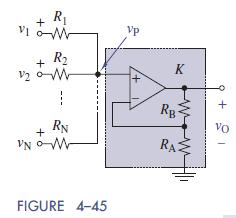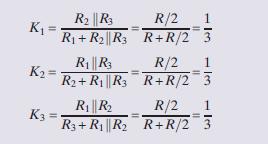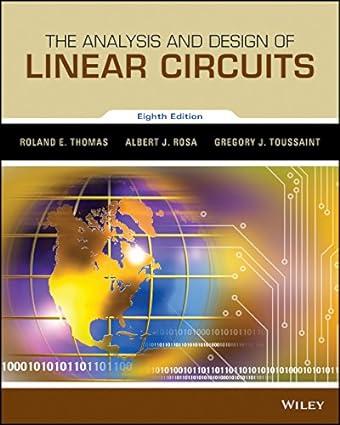Inverting amplifiers of the type discussed above have the ability to be easily designed with outputs being
Question:
Inverting amplifiers of the type discussed above have the ability to be easily designed with outputs being the weighted sum of the various inputs. While this type of OP AMP Summer is the most common by far, there is occasionally the need for a noninverting summer. In this example we analyze a noninverting summer and discuss the advantages and disadvantages of this summer versus the inverting summer.
Consider the circuit of Figure 4–45 and find the input-output relationship.

One should recognize the shaded area of the figure as being that of a noninverting amplifier with gain
![]()
Where υP acts as the summing terminal of the circuit as well as the non-inverting terminal of the OP AMP.
We can find the voltage at υP using superposition. For the contribution of υ1 we set all sources except υ1 to zero and solve for the voltage υP1

And so forth, until all input sources have been accounted for. Then using the additive property of linear circuits, we obtain the final result

While this appears to be a simple result, calculating weighted gains for each input is not so simple, especially if there are more than two or three inputs. If all the inputs are to have the same gain then selecting all source resistors to be equal, makes the circuit useful and easy to use. For example, consider a three-input noninverting summer with all source resistors equal. Using our previous result for N= 3, we get

So that our final result is

The designer can choose the OP AMP gain K to produce the overall gain desired.
If, for example, one wanted an overall gain of 10, one would choose K = 30, resulting in

In summary, the noninverting summer has the advantage of being able to sum multiple inputs with all positive gains using a single OP AMP. Its main disadvantage is that the design process of selecting resistors to achieve specific gain values can be significantly more complicated.
Step by Step Answer:

The Analysis And Design Of Linear Circuits
ISBN: 9781119235385
8th Edition
Authors: Roland E. Thomas, Albert J. Rosa, Gregory J. Toussaint





